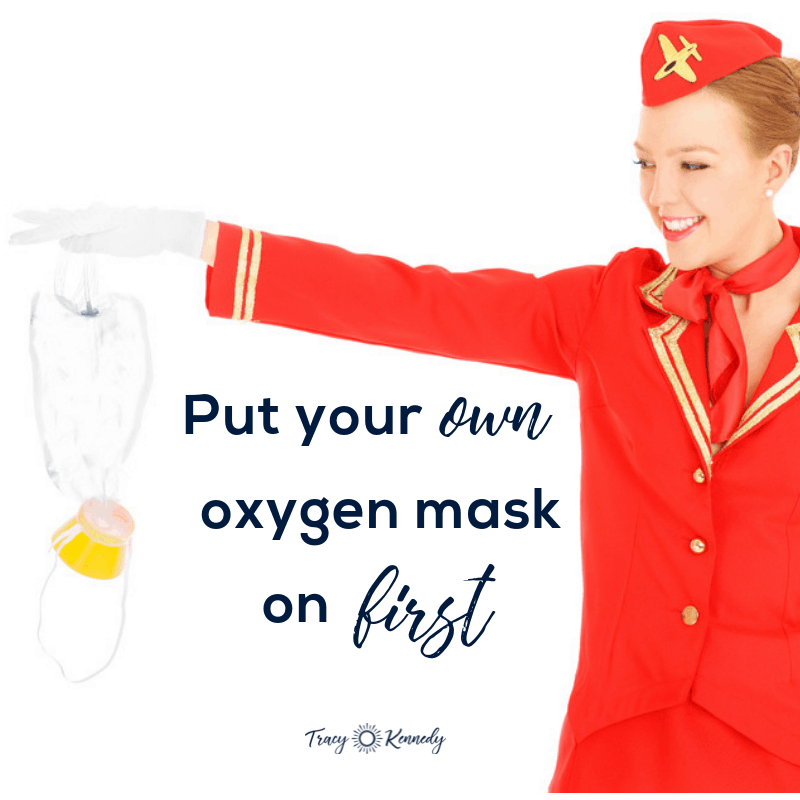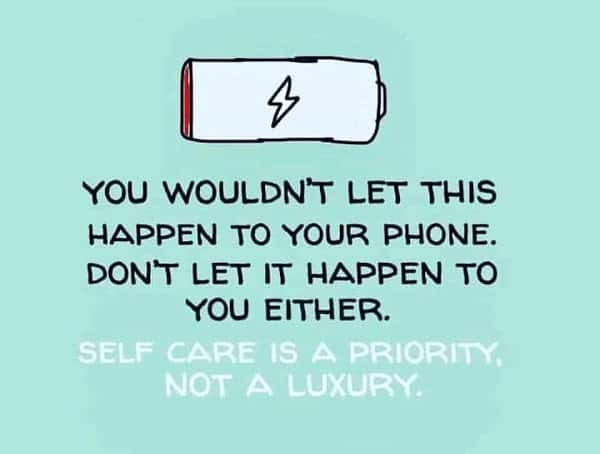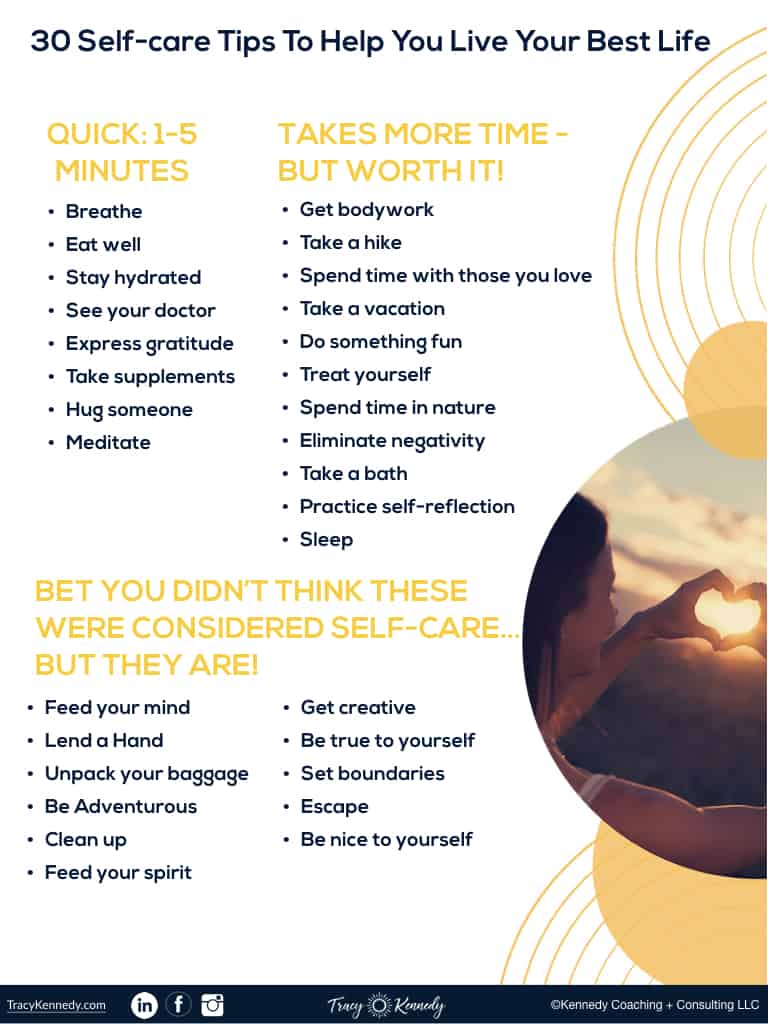What Is Self-Care?
Self-care is quite literally taking care of yourself. It isn’t just about getting a massage. It is any action you take to preserve and improve your health, wellness, happiness and fulfillment. We’ve all heard the saying, “you can’t pour from an empty cup” or “put on your own oxygen mask before assisting others.” These are self-care. You cannot take care of others if you do not take care of yourself first. This takes on a whole new meaning when you also have kids and a family. self Self-care is doing what needs to be done so you can be balanced and energized to achieve all that you want out of life. Self-care nourishes your mind, body and spirit and allows you to thrive. It increases your happiness, ability to be successful and the quality of your life and relationships. When I look at it that way, not as something for the weak, but as something to help us live our best lives, then instead of becoming an ‘nice to have’ it becomes an important and essential part of life. In fact, I now know it’s the only way to live my fullest life.
self Self-care is doing what needs to be done so you can be balanced and energized to achieve all that you want out of life. Self-care nourishes your mind, body and spirit and allows you to thrive. It increases your happiness, ability to be successful and the quality of your life and relationships. When I look at it that way, not as something for the weak, but as something to help us live our best lives, then instead of becoming an ‘nice to have’ it becomes an important and essential part of life. In fact, I now know it’s the only way to live my fullest life.  That’s why I’ve pulled together 30 ways to practice self-care so you can live your best life. I’ve got you covered from an integrative wellness approach - mentally, emotionally, physically and spiritually.
That’s why I’ve pulled together 30 ways to practice self-care so you can live your best life. I’ve got you covered from an integrative wellness approach - mentally, emotionally, physically and spiritually.
30 Ways to Take Care of Yourself
Let’s start with the basics. These are self-care practices you can do daily. Many take very little time or energy, and most can be done in less than five minutes, some in less than one.
1. Breathe
Deep breathing increases circulation by bringing oxygen to your muscles and brain. This increased oxygen content leads to greater energy and healthier muscles, organs and tissues. Breathe deeply more often. What happened when you started to read this? Did you take a deep breath? Great, you’re already practicing self-care.2. Eat Well
Your body is a machine and food is your fuel. Simple as that. I’ve learned two main things studying diets over the years and working with top health doctors: First, focus on eating real, whole, nutrient-dense food; avoid processed foods and refined sugars. Secondly, find what works for you. There are lots of options out there - pale0, Mediterranean, plant-based, you name it.3. Stay Hydrated
The human body is composed of 50-65% water. Some parts of our bodies, like our brain, heart and lungs, are more than 70%. Drinking water is a simple, effective way to take care of yourself. Aim to drink eight 8-ounce glasses daily. It takes no extra time, energy and effort, so grab a glass and start hydrating.4. Sleep
I used to wear it as a badge of honor that I didn’t sleep much. However, increasingly more studies are coming out on the importance of getting enough quality sleep((Fast Company: Here’s Arianna Huffington’s Recipe For A Great Night Of Sleep)) and, more importantly, the consequences when you don’t. Make sleep a priority. Your mind and body will thank you.5. See Your Doctor
How long have you been putting off making an appointment, tolerating constant pain or dealing with something that just isn’t right? Most things can be dealt with if they’re caught early – and are much harder to manage if you wait. Grab your phone, schedule an appointment now.6. Express Gratitude
In order to live a life we love, we must first love the life we live. Research continues to surface on the science and benefits of gratitude.((happier human: 31 Benefits of Gratitude You Didn’t Know About: How Gratitude Can Change Your Life)) Being grateful is one of the simplest, yet most powerful, things you can do to take care of yourself. Here're 40 Simple Ways To Practice Gratitude.7. Take Supplements
Name what ails you and research or ask your doctor what vitamins, minerals, or herbs can support your health and well-being. For example, those with a B-12 deficiency are much more likely to experience anxiety and Vitamin D deficiency has been linked to all sorts of health problems. I take turmeric/curcumin to reduce inflammation,((healthline: 10 Proven Health Benefits of Turmeric and Curcumin)) and B2 and magnesium supplements recommended by my neurologist for hormonal migraines. Always make sure to check the quality and efficacy.8. Hug Your Kid, Spouse or Pet
Hugging boosts your oxytocin levels (the love hormone), increases serotonin (elevates mood and creates happiness), strengthens the immune system, boosts self-esteem, lowers blood pressure, balances the nervous system and releases tension. Only a few seconds can put you in a positive mood.
9. Meditate
Yep, you knew this was coming, didn’t you? Check out how to meditate here . And, if you’re one of those people who think you can’t meditate (I feel you, I was one of you!), no more excuses. Try it.10. Get Bodywork
I said that massage wasn’t the only form of self-care, but it is a good one! Bodywork is a staple of my self-care routine. Our bodies store emotional tension in ways that we don’t even realize, and bodywork allows us to release that tension. Options include chiropractic, stretching, cranial-sacral therapy, myofascial release work, osteopathy and reflexology.11. Take a Hike
Get the blood flowing. We all know the benefits of exercise. This might be a walk, run, hike, trip to the gym, yoga or stretching. Whatever you do, get your blood and body moving. Feel like you don’t have time? Try this short, 4-minute workout: https://www.youtube.com/watch?v=PwJCJToQmps12. Spend Time with Those You Love
Schedule a date night with your partner, a special day with your kiddo or happy hour with your BFF. We are biologically hardwired for relationships and connection. Studies prove that people who socialize often have higher levels of happiness. This doesn’t have to be face-to-face; sometimes a phone call is all you need (and can fit in!).13. Take a Vacation (or a Staycation)
More than 50% of Americans don’t use all of their vacation days. Take time off away from the routine of life. Make time to have fun, recover and reenergize.14. Do Something Just for Fun
When was the last time you did something because it was fun or gave you joy? Not because it had a tangible benefit, purpose or ROI? Crank up the music and dance. Laugh with your kids. Head to the bowling alley. Play a game. Write. Buy flowers. Follow your passions. Attend a fun event. The real ROI? A better, more energized, happier self.15. Treat Yourself and Your Body
When you look good, you feel good. Get a haircut, have your nails done, enjoy a facial, manicure or pedicure. When we take care of how we look physically, we feel better emotionally.16. Spend Time in Nature
Studies have shown spending time in nature has a wide range of health benefits including lowering your stress hormone levels.((Technology Networks: Twenty Minutes in Nature is Enough to Cut Stress Hormone Levels)) Get outside. Head to the forest, hit the beach or take a hike. Walking barefoot and ‘grounding’ can be especially healing.
17. Eliminate Toxicity and Negativity
Make a conscious effort to hang out with people who feed your soul and make you feel energized and alive. Eliminate or reduce the amount of time you spend with people and situations that drain you or leave you feeling exhausted. Surround yourself with love, encouragement and positive energy.18. Take a Bath
This is a simple and inexpensive way to take care of yourself. Add in a little Epsom Salts, essential oils or that bath bomb you have lying around. Light a candle, sit back, relax and unwind.19. Practice Self-Reflection
Self-reflection is about taking a step back and reflecting on your life, behavior and beliefs. Take time regularly to hop off the hamster wheel of life. Think about what’s working and what’s not, acknowledge your wins and successes; identify what to keep and what needs to change. Try journaling or check out tips for self-reflection here: How Self-Reflection Gives You a Happier and More Successful Life20. Feed Your Mind
Learn something new! As humans, we have a need to use our full cognitive capacity. We are here to grow and evolve and learning is a huge piece of us feeling energized and alive. Take a class or online course. Read a book. Listen to a podcast.21. Lend a Hand
We also have a need for significance, contribution and making a difference. Among many other benefits , volunteering has been shown to help people feel healthier and happier.22. Unpack your Baggage
Self-care is about taking care of your whole self. Often this means dealing with emotional trauma, past events or limiting beliefs. See a therapist. Talk to a coach. Have the conversation you need to have with that person you’ve been angry with for decades. Find a way to move forward.23. Be Adventurous
Get outside your comfort zone. Be brave. Challenge yourself. Whether that be a backpacking trip, trying a new activity, or pushing yourself physically, mentally or emotionally, you’ll feel proud, confident and strong.24. Tidy up!
There’s a reason Marie Kondo has become a sensation. When we seek minimization in our homes, schedules, and lives, we feel more at ease and less stressed. Try simplifying one area of your life and experience a new level of peace. Have a read on Marie Kondo's book The Life-Changing Magic of Tidying Up: The Japanese Art of Decluttering and Organizing, it may inspire you a lot!25. Feed Your Spirit
How are you feeding your soul? This can be anything that relates to you feeling inspiration which means, ‘in spirit’. Connect with what makes you feel close to something deeper, bigger, higher – or makes you feel more connected to yourself. This might include meditation, spiritual or religious study.26. Get Creative
We all have a need to grow, use our creativity and express ourselves fully. Find your creative outlet. Paint, dance or take photos. Not artistically creative? Ask questions, problem-solve or build something. One of my daughters loves building. When she ideates, draws up plans and brings them to life, she is noticeably happier and more confident.27. Be True to Yourself
Self-awareness and being true to yourself are essential to living a happy, fulfilled and successful life; therefore, these are critical elements of self-care. Listen to your inner voice. Identify what you need. When we are out of alignment with ourselves, we are more stressed, overwhelmed and at higher risk for health issues. Here are 11 ways to be true to you: How To Be True To You When Life Pulls You Off Track
28. Set Boundaries
This is important to healthy relationships, a strong sense of self-esteem and healthy life. You must know what you will and won’t accept. Identify where energy is leaking out from your life. If you continue to give when you have nothing to give or say 'yes' when you mean 'no', you will continue to suffer. Know, acknowledge and honor your limits and boundaries - physically and emotionally.29. Escape
While avoidance and numbing can be detrimental, a little escape can help recharge your batteries. So watch that reality TV show without guilt, catch the latest movie, delve into that novel, or head to the museum. What transports you and completely allows you to shut off?30. Be Nice to Yourself
Be kind, patient and understanding. Treat yourself like you would a close friend. Speak to yourself as you would someone you love. You are enough. You are doing enough. Give yourself a break, a little more love and a lot more compassion. You are doing a great job - time to tell yourself that.No More Excuses
Now you have 30 ways to take care of yourself! However, you may still have nagging thoughts in the back of your head about why you can’t. Here are the most common excuses I hear with a strategy to help:I don’t have time for it.
How many hours per day do you spend watching TV or on social media? Some studies show that the average adult spends over four hours watching TV and over two on social media. What if you took just half that to take care of yourself? Or 1/10th?! We all have the same 24 hours in a day. It’s what you choose to do with that time that counts. Many of the suggestions above require no time at all. Take a breath, drink an extra glass of water, speak nicely to yourself, grab an apple.I don’t need it.
Trust me, if you don’t take care of yourself now, you’re going to get that wake-up call one day, if you haven't already. I guarantee it’s going to take a lot more time and energy to fix what’s broken than to take care of it along the way. You have a responsibility to do this for yourself.I’m too tired.
Great! Take a nap. Then you’ve done your self-care for the day. No joke. Too often when we are tired, we drink coffee, reach for a sugary snack or find some other way to distract ourselves. Self-care is different from day to day. Some days it will be harder than others. Each of the items on the list are meant to GIVE you energy, not take it away. You’ll be amazed at how much more energized and awake you feel after one of these practices.It‘s just too hard.
One big reason people don’t get started is because they think it’s going to be hard. Don’t fall into this trap and do nothing at all. Choose something that feels simple and easy to do - and do it. There is no step too small.Know Your Motivation
It’s not the action of self-care that’s most important. It’s about what you get by taking care of yourself. What is the real value or importance of self-care in your life? To be a better mom, look good, be healthier, have more energy, reduce your stress levels, feel better, see your grandkids graduate from college, get that promotion, sustain the business you’re building, perform at your very best? Know your why so you can tap into the motivation for taking care of yourself. If you’re doing this because you ‘should’, it just won’t happen or be sustainable. You must do this because you see value, purpose and benefits at some level. What are those for you?Last Things Last
“Take care of your body, it’s the only place you have to life” - Jim RohnSelf-care is about doing what makes you feel good – mind, body and spirit. If you remember only one thing: Do more of what makes you feel good, brings you energy and joy and do less of what doesn’t. Had I taken better care of myself in my late teens and my early twenties, I might have avoided two knee surgeries, stress fractures and arthritis. Had I taken better care of myself in my thirties, perhaps I could have avoided anxiety and a near breakdown . But that was my journey and it led me here. And I have to say, I’m pretty happy where here is. So now, in my forties, while I still may cringe at the term, I pay attention to and practice self-care. And I often wonder if maybe, just maybe, I continue to take good care of myself, I may just be able to run that marathon one day after all.
More About Practicing Self-Care
- 30 Ways To Practice Self-Love And Be Good To Yourself
- How Self Care Can Help You Live Your Best Life
- 6 Signs You Haven't Made Self-Care Your Top Priority
- How to Build Self Esteem (A Guide to Realize Your Hidden Power)
from Lifehack - Feed http://bit.ly/2x28hu4
No comments:
Post a Comment